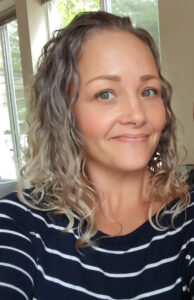Resident Services Coordinator Brings Wealth of Practical Experience
After her partner was let go from her job unexpectedly, and with new employment difficult to secure, Desiree and her family – including two children – found they weren’t able to continue paying rent and exited into homelessness. After sleeping in their car for three months, Desiree visited SVdP’s First Place Family Center to inquire after support for homeless families. With neither women having families in the area to offer support, their only avenue was to secure stability through local social service programs. After a short while, an opening presented itself in the Interfaith Night Shelter Program, now located at The First Place Annex, and Desiree and her family were given meals, access to showers and laundry, and a warm place to rest with their children.
Over the months Desiree and her family were unhoused, they rotated through 6 or so of the faith communities that comprised the Interfaith Night Shelter Program. Each evening families would check in at the First Place Family Center and be delegated to one of the participating churches, where they would spend their nights in safety, continuing the search for employment and housing the next morning.
“Moving was difficult,” shares Desiree. “Going from church to church every night, it wasn’t ideal. But having a warm place to lie down my baby at night was huge… and to have a place to shower. Staying clean while unhoused is difficult.”

And the program was incredibly supportive and caring to the families.
“…having a warm place to lie down my baby at night was huge…”
“Around Easter, William and Diana Wise – former program managers at First Place – presented each family with massive Easter baskets. Nobody was expecting it, and it was an exciting surprise that helped the families to feel a sense of normalcy, a sense of Home.”
About that time, Desiree and her family moved into a transitional housing program through ShelterCare. While utilizing First Place, Desiree had been able to place their names on the Lane County Centralized Waitlist. When their names came up, they were able to move to a less-mobile shelter system and focus on staying put and saving money.
“We worked the entire time we were in the Night Shelter Program. We were saving a little money – which is almost impossible to do when you are homeless – and with the help from First Place in the form of a deposit, we were able to find a permanent home for myself, my partner, and the kids. I’ve been here since 2014, and went to work for ShelterCare for four years. When I saw the opportunity to work for St. Vinnies, I thought ‘what better way to give back to the community than to serve the organization that served me?’ I’ve been with Vinnie’s in the Resident Services program for one and a half years now!”
When asked if her experiences changed the way she performs in her job, or her interactions with tenants, she replied with a resounding, “Yes!”
“Knowing the struggles that our tenants have – mental health, illiteracy, and other varying struggles – my experiences both personally and professionally have helped to change my perspective in the way I work with them. I have more empathy, compassion, and understanding. Our residents are doing their best, and we need to understand that it can change from moment to moment. It helps me to not put my expectations of what I think they should be doing on their shoulders.”
And what does Desiree love best about the Resident Services Program?
…my experiences both personally and professionally have helped to change my perspective in the way I work…
“The community events we put on! We host lots of things, but bingo is my favorite. Many of the tenants I work with tend to self-isolate, or have mental or physical health issue that create depression. But they’ll come to bingo! It gets them out and socializing. This leaning towards isolation is a trend found in many of the residents scattered throughout our properties, so interactions with their neighbors is important! I also love the Food Pantry program we run. When money and food run out, especially towards the end of the month, it is incredible they can simply go downstairs in the building they live in and shop for their needs – particularly for those with barriers to traveling to retrieve a food box off site.”
Lastly, when asked what she wished our community knew about families experiencing homelessness, she was thoughtful in her reply.
“First, most people don’t choose to be homeless. That is a misconception. Another is that folks tend to think those who are unhoused are lazy, or not trying hard enough. I wish they knew that there are a lot of mental health issues that can keep them from being successful in stable housing. We need more programs to help with housing people! If you want to end the cycle of homelessness, then fund the programs that offer wraparound services so they don’t keep falling in and out of stability. And finally, remember to meet people where they are at, and help them from there. Help them get clean, aid them in their mental health crisis – one step at a time, and meet them step for step.”
